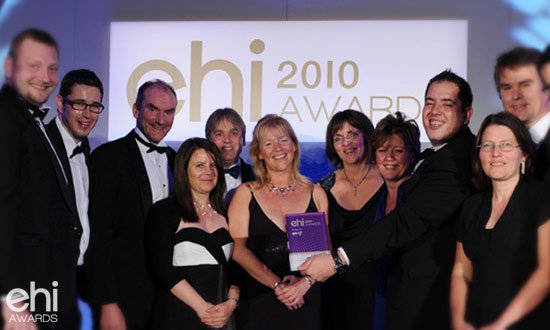EHI Awards 2010: Team working
- 23 December 2010

Andy Kinnear, head of the Avon IM&T Consortium, readily admits that other areas have done more exciting, cutting edge IT developments.
What makes his team great – and what won it healthcare IT team of the year – is its dedication to service, support for clinicians and general can do attitude.
The team’s vision statement is “enabling improved patient care” and it does this by delivering new clinical computer systems, business intelligence solutions, enhanced data and systems security, world class IT training, frontline and second line support, technology deployment, business change and project management.
As Kinnear says: “The Consortium is a public sector IT success story – and a great example to shout about.”
Four years’ hard work
Avon IM&T Consortium came into existence in April 2007, when four west country primary care trusts merged their small IT departments to create economies of scale and beef up their capabilities.
Naturally, people felt nervous at the start. Change is never easy. “We have gone from a place where people perhaps felt slightly resentful to becoming a real team,” says Kinnear.
One of the changes enabled was separating staff into operational and project management roles.
Kinnear says: “You cannot ask people to run an operational service and at the same time focus on a five year strategy. If you do, you end up with broken individuals.
“But to create project teams and operational teams, you need a critical mass and a breadth of experience in your team that many smaller organisations lack.”
The merged organisation has allowed him to do that. “I know that we could not have attracted, developed and retained the calibre of people we have here or developed the project management tools, discipline and processes if we had been in an organisation serving one PCT.”
So, on the one hand there is a help desk that responds quickly and efficiently. Dr Andrew Appleton, a South Gloucestershire GP and IT lead, bears testament to this.
“They are very sensitive to the fact that a lot of the kit we use is mission critical and they respond very quickly. If my practice has a PC that goes down, they are there the next day with a new one,” he says.
On the other, the team has delivered a wide range of new systems that support improved patient care. “Delivery is our mantra,” says Kinnear. “We apply professional project management processes and techniques to deliver on time, within budget and to agreed standards.”
Having a carnival with RiO
Take the deployment of the community and mental health system, RiO, across three PCTs in 2010. All three sites went live within three months using one project team, but with the system tailored to local needs.
Kinnear says: “It is saving hours chasing notes, improving scheduling, allowing audit of records and ultimately allowing clinicians to concentrate on care giving instead of administrative tasks.”
Sue Fields, chief executive of Bristol Community Healthcare, agrees. “The team was incredibly responsive and supportive to our RiO implementation and it has been brilliant in terms of providing better clinical information,” she says.
“Our staff are now better trained in using IT and there has been a cultural change in community services where they now see using IT as an enabler.”
Her team is now an early adopter site for the Department of Health’s mobile working initiative that will see district nurses, podiatrists and physiotherapists using mobile computing and digital pens on a daily basis.
Kinnear adds: “That’s a piece of work that will make a huge difference to clinicians’ work. There is a real buzz about it.”
Information is power
Others deployments include Careplus, which allows electronic management of child health information, a data warehouse to support commissioning and risk stratification tools that allow GPs to pinpoint those patients most likely to be admitted to hospital in an emergency.
Dr Appleton says the team’s work has impacted right across primary care and not just in those practices that are IT savvy.
He says: “They have worked with practices trying to assess our needs and develop our own IT strategies and infrastructure. They have managed the budget in such a way that it has been equitable.”
Developing the data warehouse required a high degree of clinical engagement, he adds, with lots of questions about information governance. “They worked closely with the practices and the local medical committee to put together a project that was agreeable to all concerned.
“I think over the last couple of years it has gained increasing acceptance and now with the advent of GP commissioning it is being seen as a potentially powerful tool to help us manage a lot of data.”
He also cites work on the primary care element of acute trust deployment of Sunquest Information Systems, now underway. It will allow EMIS and some iSoft practices to request investigations at acute trusts in Bristol and see results on line.
“I can now click on a link in the patient record and it sends me to a site in the hospital system,” says Dr Appleton. “It’s proving very useful.”
Uncertain times
The future for Avon’s IM&T team – like the future for every team in a PCT right now – is far from clear. Kinnear is keen to maintain the buzz about current and future projects but admits that it is hard in the current climate of uncertainty, with finances tight and another NHS reorganisation underway.
The Consortium has set up an AIM&TC Futures Programme to explore ways forward, whether that’s continuing to provide services to GPs as part of a rump PCT organisation, vertical integration with an acute trust IT department, or going it alone as a free enterprise. “We are only just starting to nail down the options,” he says.
In the meantime, the EHI award is very welcome. “I know we are not the finished article and I am damn sure that there are other teams that area ahead of us in terms of innovation,” he says.
“But in terms of recognition for the journey we have taken since we came together in 2007, this award is a real morale booster.”





